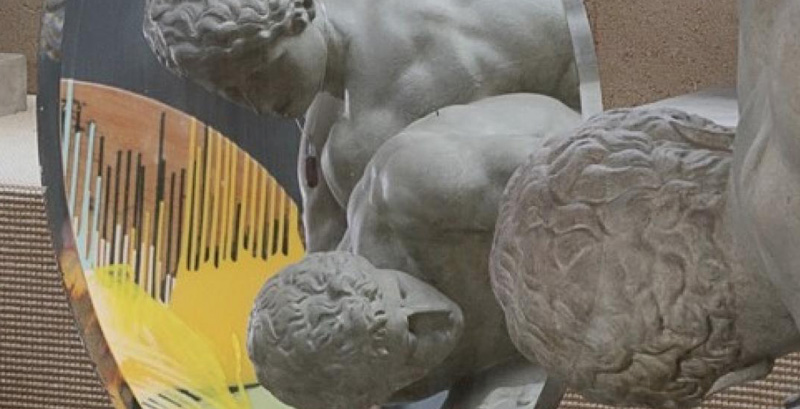Ruthie Collins, founder of Cambridge Art Salon, gives her arty picks of the month
Summer, with its ‘mad, naked’ nights (Walt Whitman) can feel like a glorious surprise when it arrives. As it gets hotter, the sea calls. But as a sense of crisis and action deepens in relation to the sea, we all yearn to protect its life and its beauty. I’ve just had a poem published in Like the Sea I Think, a new collection of maritime writing from East Anglia. Called Persephone Wakes, it’s part literary activism in response to the climate emergency, part joyous sea-quest to reawaken our connection to the planet. With East Anglia’s many beautiful coastal spots, it remains a source of inspiration for artists in Cambridge: communicating with the sea can be a rhapsodic way of connecting to the natural world.
So, if you can’t get out to the beach, why not take your pick of seascape-inspired artists this month and go on a sea-quest of your own? Anja Perry’s first ever solo show is at Boudoir Femme on King Street this month, featuring sea-inspired, light, visceral acrylics on glass – not a canvas or paintbrush used, these iridescent beauties are created using acrylic pouring. A former shipping lawyer and diving instructor, Perry shows her technical and professional influences in this sparkling show. Or, as this is the time of year that art pilgrims march around the city as part of Open Studios, continue your sea-quest there. For anyone new to the city, or the initiative, which attracts thousands of visitors every year, this is a fantastic way to meet artists face to face, or enjoy some lesser known spots opened up to the public. There are literally hundreds of artists and spaces to choose from, so I’d recommend having a cuppa, a leaf through the guide and, in addition to going along to your personal favourites, making space for new artists this year.
Enjoy Alison Litherland’s wild, expressive abstracts at Artworks, or Lyz Gardner, whose studio is out in Ely, is an East Anglian oil painter whose work you can find in Cambridge Contemporary Art. Catherine Mellis’ bold, elusive monoprints are a joy, inspired by scuba diving, light and being underwater. Helen Foster, a scientist whose art teacher told her to see a psychologist if she wanted to study art – paints abstracts with a scientific twist, with startling results (choose science or art – ‘do both’ she says!). Or check out Melanie Max, whose bright, evocative seascapes are full of light. Don’t forget Cheryl Warren’s stunning abstracts: mesmerising and uplifting.
Communicating with the sea can be a rhapsodic way of connecting to the natural world
Those with kids in tow, find children’s illustrators to entice the little ones – Amanda Hall, exhibiting in Romsey Town, is ace (and you’re not far from the Cambridge Waffle Company on Mill Road, with its amazing draw-on-the-walls colouring in – why not draw the sea?).
I’m also making time to head to The Silence of Time: The Spaces In-Between, by Loukas Morley at the Museum of Classical Archaeology this month (pictured). This long-awaited solo show, at one of Cambridge’s most fascinating hidden-away museums, will be a treat for fans of Morley’s work. His large-scale abstracts are striking in their modernity and bold colour in this environment. Sea-questers can hunt for the Cape Artemisium God, possibly Poseidon, Greek god of the sea, which was found in a shipwreck, while enjoying the collection of 450 casts of classical sculpture on display. Or hunt for the Lysicrates Monument (Dionysus turning pirates into dolphins – they had kidnapped him, so he punished them).
“Loukas has achieved something really quite rare and exciting with this exhibition,” enthuses curator Suzanne Turner. “It is no exaggeration to say he has transformed our Cast Gallery, making time and space seem to fold upon itself with carefully placed mirrors and large-scaled installations. Newly made works nestle among the casts, but even the older pieces from his repertoire seem at home. It is almost as if they had always been here, amplifying the very lifeforce of our classical collection.”
Finally, for those looking for actual sea, there’s also the chance to catch Will Self this month over in Great Yarmouth. He’s talking with Ryan Gander, whose bold sculpture, Really bad thing seen from a different perspective (The pet giraffe of the thief that stole a Barbara Hepworth sculpture from Dulwich Park), has been installed at Merrivale Model Village. On the way back to Cambridge, catch Lines of Sight: WG Sebald, at Norwich Castle; an exhibition on one of East Anglia’s most respected writers. Whatever you do, make the most of those glorious afternoons. “Summer afternoon – summer afternoon… the two most beautiful words in the English language,” (Henry James). Have a fantastic July, all.

